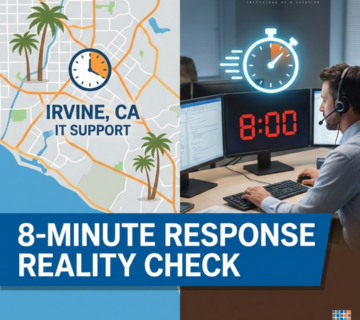Another Airline Hit by Cyberattack, Resulting in Mass Cancellations
🎙️ Dive Deeper with Our Podcast!
Explore the latest Another Airline Hit by Cyberattack, Resulting in Mass Cancellations Now with in-depth analysis.
👉 Listen to the Episode: https://technijian.com/podcast/japan-airlines-cyberattack-and-aviation-cybersecurity/
Subscribe: Youtube | Spotify | Amazon
The aviation industry faces a growing challenge: cybersecurity threats. The latest victim of such an attack is Japan Airlines, whose systems were disrupted on December 26, 2024. This incident highlights the vulnerabilities of critical infrastructure and raises important questions about the future of cybersecurity in the airline industry.
Overview of the Cyberattack on Japan Airlines
On the morning of December 26, Japan Airlines reported a malfunction in its network that connected internal and external operating systems. This disruption, suspected to be caused by a distributed denial-of-service (DDoS) attack, resulted in the delay of 60 domestic flights and left passengers stranded during a busy travel period. Online ticket purchases were also suspended, further compounding the chaos.
While the airline managed to resolve the issue within 90 minutes, the attack underscored the potential damage such incidents can cause. Japan Airlines was quick to assure the public that no passenger data was leaked and that their systems had been restored to full functionality.
Historical Cybersecurity Incidents in the Airline Industry
The Japan Airlines attack is not an isolated incident. Over the past few years, airlines have increasingly become targets for cyberattacks.
In July 2023, a software breakdown in the CrowdStrike platform, used for check-in processes, led to widespread disruption across several airlines. Delta Air Lines suffered $500 million in losses due to flight cancellations and later pursued legal action against the software provider.
A month later, Seattle-Tacoma International Airport was targeted by the Rhysida hacker group. This attack compromised passenger data and demanded a ransom of 100 Bitcoin ($6 million). Alaska Airlines, one of the affected carriers, refused to meet the ransom demand, highlighting the tough decisions companies face during such crises.
Details of the Recent Japan Airlines Cyberattack
The incident began around 7:30 a.m. Tokyo time and primarily impacted domestic routes. Flights from Tokyo to cities like Osaka and Izumo, as well as return routes, were either delayed or canceled. Stranded passengers were seen at Tokyo’s Haneda Airport, facing delays of up to four hours.
In a statement, Japan Airlines explained that the issue arose from receiving a “large amount of data from an external source.” By 2:00 p.m. local time, the airline confirmed that systems were fully restored, and no sensitive information was compromised.
What Is a Distributed Denial-of-Service (DDoS) Attack?
A DDoS attack occurs when multiple systems flood a target’s servers with excessive requests, overwhelming its capacity to function. These attacks are often used to disrupt services, extort money, or create chaos. In the case of Japan Airlines, the sheer volume of data overwhelmed their systems, causing widespread disruptions.
The Growing Cybersecurity Threat in Aviation
Airlines have become high-value targets for cybercriminals due to their reliance on interconnected systems and the critical nature of their operations. From ransomware to data breaches, the threats are multifaceted and evolving rapidly. Cyberattacks can disrupt operations, compromise sensitive data, and even pose safety risks to passengers.
Impacts of Cyberattacks on Airlines
The consequences of cyberattacks in the aviation sector are significant. Financial losses can be staggering, as seen in Delta Air Lines’ $500 million lawsuit against CrowdStrike. Operational disruptions, such as flight cancellations and delays, lead to customer dissatisfaction and logistical nightmares. Perhaps most critically, repeated breaches can erode consumer trust in an airline’s ability to safeguard their data and ensure uninterrupted services.
How Japan Airlines Responded to the Attack
Japan Airlines acted swiftly to address the cyberattack. By identifying the source of the issue early, they were able to restore systems within 90 minutes. The airline’s transparency in communicating with the public and its assurance that no customer data was compromised helped mitigate potential reputational damage.
Lessons Learned from the Japan Airlines Incident
This incident provides several important takeaways for the aviation industry:
- Rapid Response is Crucial: Quick action can limit the impact of a cyberattack.
- Transparent Communication Builds Trust: Keeping stakeholders informed reassures passengers and partners.
- Investments in Cybersecurity Are Non-Negotiable: Proactive measures can prevent costly disruptions.
What Can Passengers Do to Protect Themselves?
While airlines bear the primary responsibility for cybersecurity, passengers can also take steps to protect themselves:
- Avoid using public Wi-Fi to access sensitive accounts.
- Stay vigilant for phishing scams or fraudulent communications.
- Regularly monitor accounts for suspicious activity.
The Future of Cybersecurity in the Aviation Industry
As technology continues to play an integral role in aviation, cybersecurity will remain a top priority. Airlines are increasingly investing in advanced threat detection systems, employee training, and partnerships with cybersecurity firms to stay ahead of potential threats. International cooperation and regulatory frameworks will also play a key role in enhancing the industry’s resilience to cyberattacks.
How Technijian Can Help Airlines Combat Cybersecurity Threats
Technijian specializes in providing cutting-edge cybersecurity solutions tailored for the aviation industry. With expertise in threat detection, data protection, and incident response, Technijian helps airlines safeguard their operations and maintain customer trust. By partnering with Technijian, airlines can benefit from:
- Advanced threat detection and prevention systems.
- Comprehensive employee training to identify and mitigate cyber threats.
- 24/7 monitoring and rapid response services.
Technijian’s holistic approach ensures that airlines are prepared to tackle the ever-evolving landscape of cybersecurity challenges.
Frequently Asked Questions (FAQs)
1. What caused the Japan Airlines cyberattack?
The attack was a suspected DDoS attack, involving a massive influx of external data that overwhelmed the airline’s systems.
2. Was passenger data compromised in the attack?
No, Japan Airlines confirmed that no customer data was leaked or compromised.
3. How can airlines protect themselves from cyberattacks?
Airlines can invest in robust cybersecurity infrastructure, train employees to identify threats, and collaborate with cybersecurity firms for advanced protection.
4. What are the potential impacts of cyberattacks on airlines?
Cyberattacks can result in financial losses, operational disruptions, and damage to consumer trust.
5. How quickly was Japan Airlines able to resolve the issue?
The airline resolved the issue within 90 minutes and resumed normal operations.
6. How does Technijian assist airlines in cybersecurity?
Technijian offers advanced cybersecurity solutions, including threat detection, employee training, and rapid incident response services tailored to the aviation industry.
Protect your operations and passengers with Technijian’s comprehensive cybersecurity solutions. Contact us today to learn more about how we can help secure your airline’s future.
About Technijian
Technijian is a leading managed IT services provider in Orange County, dedicated to empowering businesses with cutting-edge technology solutions. Headquartered in Irvine, we deliver robust IT support in Irvine, Anaheim, Riverside, San Bernardino, and throughout Orange County, ensuring secure, scalable, and seamless IT environments for businesses of all sizes.
As a trusted managed service provider in Irvine, we specialize in aligning technology with business goals through tailored IT consulting services in San Diego and beyond. From managed IT services in Anaheim to comprehensive IT support in Orange County, our expertise spans IT infrastructure management, IT outsourcing, and business IT support. Our goal is to help you focus on growth while we manage your technology needs.
At Technijian, we offer dynamic and customizable managed IT solutions designed to enhance efficiency, protect data, and ensure unparalleled IT security. Our services include cloud computing, network management, IT systems management, and proactive disaster recovery solutions. With dedicated support across Riverside, San Diego, and Southern California, we ensure your business stays resilient, agile, and prepared for the future.
Our proactive approach encompasses IT help desk support, IT security services, and solutions tailored for IT consulting in Los Angeles. We also specialize in IT solutions for Riverside and cutting-edge IT security solutions in Orange County, delivering unmatched reliability and protection against ever-evolving cyber threats.
Partnering with Technijian means gaining a strategic ally committed to optimizing your IT performance. Experience the Technijian advantage with our innovative IT support services in Orange County, IT consulting services in Southern California, and managed IT services in Irvine that meet the evolving demands of modern businesses.





